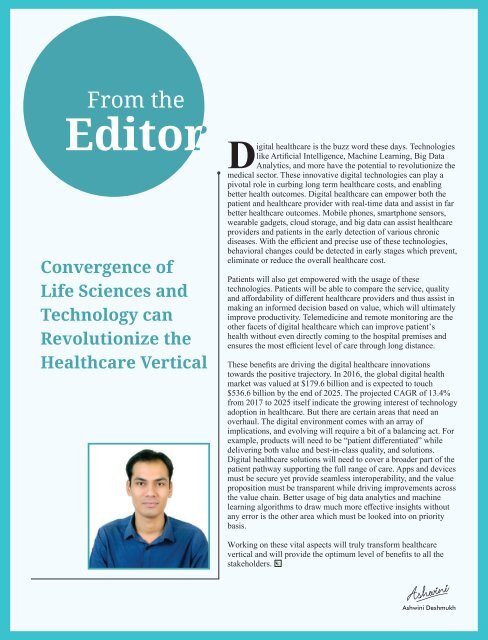The 10 Most Innovative Digital Healthcare Solution Providers 2018
Create successful ePaper yourself
Turn your PDF publications into a flip-book with our unique Google optimized e-Paper software.
From the<br />
Editor<br />
Convergence of<br />
Life Sciences and<br />
Technology can<br />
Revolutionize the<br />
<strong>Healthcare</strong> Vertical<br />
igital healthcare is the buzz word these days. Technologies<br />
Dlike Artificial Intelligence, Machine Learning, Big Data<br />
Analytics, and more have the potential to revolutionize the<br />
medical sector. <strong>The</strong>se innovative digital technologies can play a<br />
pivotal role in curbing long term healthcare costs, and enabling<br />
better health outcomes. <strong>Digital</strong> healthcare can empower both the<br />
patient and healthcare provider with real-time data and assist in far<br />
better healthcare outcomes. Mobile phones, smartphone sensors,<br />
wearable gadgets, cloud storage, and big data can assist healthcare<br />
providers and patients in the early detection of various chronic<br />
diseases. With the efficient and precise use of these technologies,<br />
behavioral changes could be detected in early stages which prevent,<br />
eliminate or reduce the overall healthcare cost.<br />
Patients will also get empowered with the usage of these<br />
technologies. Patients will be able to compare the service, quality<br />
and affordability of different healthcare providers and thus assist in<br />
making an informed decision based on value, which will ultimately<br />
improve productivity. Telemedicine and remote monitoring are the<br />
other facets of digital healthcare which can improve patient’s<br />
health without even directly coming to the hospital premises and<br />
ensures the most efficient level of care through long distance.<br />
<strong>The</strong>se benefits are driving the digital healthcare innovations<br />
towards the positive trajectory. In 2016, the global digital health<br />
market was valued at $179.6 billion and is expected to touch<br />
$536.6 billion by the end of 2025. <strong>The</strong> projected CAGR of 13.4%<br />
from 2017 to 2025 itself indicate the growing interest of technology<br />
adoption in healthcare. But there are certain areas that need an<br />
overhaul. <strong>The</strong> digital environment comes with an array of<br />
implications, and evolving will require a bit of a balancing act. For<br />
example, products will need to be “patient differentiated” while<br />
delivering both value and best-in-class quality, and solutions.<br />
<strong>Digital</strong> healthcare solutions will need to cover a broader part of the<br />
patient pathway supporting the full range of care. Apps and devices<br />
must be secure yet provide seamless interoperability, and the value<br />
proposition must be transparent while driving improvements across<br />
the value chain. Better usage of big data analytics and machine<br />
learning algorithms to draw much more effective insights without<br />
any error is the other area which must be looked into on priority<br />
basis.<br />
Working on these vital aspects will truly transform healthcare<br />
vertical and will provide the optimum level of benefits to all the<br />
stakeholders.<br />
Ashwini Deshmukh
















